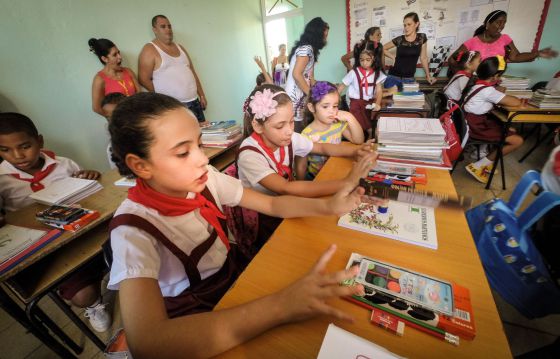
Avoiding the audacity of presidents who come to international summits with a translator in their hand luggage and babble semantic nonsense if they lose their translator, Raul Castro publicly acknowledged that his English is bad, but that his successor must be able to speak it. “I speak English very, very bad and at my age it’s going to be very difficult to learn it,” he said four years ago at a summit in Trinidad and Tobago. His brother, Fidel, isn’t Shakespeare either but he knew how to express himself during the first visit to the United States in 1959, the year of revolutionary victory. “The Chinese studied English, the Russians studied English and we studied Russian,” he commented on one occasion, admitting the error of not having promoted the teaching of English in Cuban schools.
The resumption of diplomatic relations with the United States has put the languages in their place: English first at the start of the school year that began this month, and afterward Russian, which previously replaced English in the 1970s when the Soviet Union was Cuba’s main ally.
The accelerated increase of contacts with American society and the massive influx of tourists, intellectuals, businessmen, artists and athletes, as well as new technologies, compel the Caribbean island to strengthen English as a universal language. “It is essential,” emphasized Jose Ramon Machado, member of the Political Bureau of the Communist Party, in August at a meeting with undergraduates. “And if we can do it today, let’s not put it off until tomorrow.”
Russian was a mandatory subject during the Soviet boom. In one of the vocational schools, the Vladimir Ilyich Lenin School, the most outstanding students recited poems by Pushkin fluently. Russian movies and books were everywhere in Cuban society and [the nation’s] interrelations with the many thousands of volunteers who arrived from the Slavic nation lasted decades.
The priorities of the government and citizenry have changed since Dec. 17 of last year, when President Barack Obama announced the beginning of the process toward diplomatic normalization. The number of English tutors has multiplied on the island as well as young people willing to pay for their classes in convertible pesos, which are equivalent to the dollar.
And just as the Spanish presidents of the transition sweated blood in the groups where the European politicians whispered cheek-to-cheek without interpreters, the night of Apr. 20, 1959 was also agonizing for Fidel.
The commander-in-chief had to speak in the auditorium at Princeton University, near New York. He did so admitting his language handicap. “It is hard work for me tonight. But I think by gathering up all the English that I have read in my life when I was a student or in papers that I have read, and by gathering all the words, I try to speak English.” By fits and starts he made himself understood.
The United States expects to immerse itself in all corners of Cuban society without making a lot of noise; in teaching English, it has found a valuable way to do it. The website of its embassy in Havana says that promoting the knowledge of the language among Cubans is one of the “fundamental objectives” of the legation’s Department of Public Affairs.
Polyglots are in major abundance in the Antilles due to the international policies of the Cuban revolution in Africa and Asia, and its membership in the Non-Aligned Movement. The close relations with the former Democratic Republic of Germany and other countries of communist Europe allowed thousands to learn German, Romanian and Bulgarian, and the officials assigned to countries with more complicated languages learned Swahili and Creole. But the boom now is in English — for doing business, listening to music, reading, navigating the Internet and understanding the expected surge of [commodities] “Made in USA.“

Leave a Reply
You must be logged in to post a comment.